Sifting through the millions of Georgia public records that include criminal records, inmate records, court records, and vital records can be tricky unless users understand how free public records search options work.
The state’s public records are classed in different types, ranging from documents, electronic records, photographs, and books to maps. This makes locating a particular record daunting, tedious, and time-consuming without a simple tool that can access all the databases at once.
Anyone can search free public records quickly right here or users can access the individual databases using the tools provided in this article.
Does Georgia Have Open State Records?
Georgia, through its Open Records Act (OCA), mandates that all public records are available to its residents.1 Therefore, Georgia residents have the right to access, scrutinize, and copy Georgia public records and are not required to provide a reason to access said records. Non-residents of the state are also permitted to access these records as residency is not a requirement.
Georgia state records are typically made available within three business days after the request; a nominal fee may be associated with the request, generally reproduction charges.
There are some exemptions to records that can be accessed, notwithstanding the act; these include social security numbers (SSN), confidential documents, medical records, government employees’ information, juvenile records (minors’ criminal records), and trade secrets, among others.
Third-party search sites offer record checks for a fee, returning accurate, up-to-date results, and are not limited in geographical scope encountered when accessing official government sites. They are also quicker and easy to use and provide an excellent launch point for a records search.
What Shows Up on Georgia Criminal Records?
Access to criminal records is imperative for many reasons, including safeguarding the community and employing trustworthy individuals or homeowners looking to rent out to honorable persons.
Georgia criminal records usually include but are not limited to:
- Bio data of the subject, i.e., name, date of birth (DOB), SSN, sex, etc.
- Arrest data such as date of arrest
- Prosecutor information
- Prison term and release date
- Judicial disposition information etc.
Are Criminal Charges Public Record in Georgia?
Georgia criminal records are public records due to the state’s Open Records Act, which is in line with the Freedom of Information Act (FOIA).2 Anybody can access criminal records without having the need to provide a reason.
There are some exemptions to this. The criminal record may be sealed or expunged. As per the O.C.G.A. §35-3-37, certain criminal records are exempted from view by the public. These include dismissed cases and those not present for a jury, as well as ‘time-expired restrictions. Such records are only available to law enforcement agencies and judicial officials. Juvenile records are also typically sealed and not available for public scrutiny.
How To Perform a Criminal History Check in Georgia
Investigating a criminal history check on an individual is essential for the safety of the community and workplace. Requesters to criminal history reports may also find details to arrest records, court records, and background checks below.
Individuals looking to perform a perform a criminal history check or arrest record search in Georgia can commence a search through the sheriff’s offices and local police departments. Criminal history records can be obtained from courts of law. Individuals may request a personal criminal history check and may do so for another person with consent, facilitated by O.C.G.A. § 35-3-34.
For example, the Paulding County Sheriff’s Office, the City of Chamblee, and Hall County have web pages dedicated to persons looking to complete criminal history checks and their related costs.3 Requesters will need to provide valid IDs such as a driver’s license, photo ID, or SSN card.
Qualified agencies and employers may contact the Georgia Criminal Information Center (GCIC) to obtain a criminal history report. Individuals will need to book an appointment in advance when visiting the lobby. Requests can be mailed to:
Georgia Crime Information Center
CCH/Identification
P.O. Box 370808
Decatur, Georgia 30037
Appointments can be scheduled via (404)244-2639.
How Do I Find Recent Arrests in GA?
There is a stark difference between a criminal record and an arrest record in Georgia.
When an individual is ‘arrested’, they are taken into custody due to an ongoing investigation. A record is created of the arrest, which will remain with the agency with jurisdiction over the arrest. They will, however, not yet have a criminal record. Once convicted of the crime, by being found guilty in a court of law, a criminal record is created.
The best place to investigate to find out if someone has been arrested or is in jail would be to contact the local police department or sheriff’s office. Therefore, it is prudent to establish which jurisdiction the arrestee may be located in and establish contact with the agency. Individuals may also obtain jail paperwork from these law enforcement agencies.
For example, Clayton County has an Inmate Search tool that can be used to track recent arrests within the county.4 Hall County Sheriff’s Department also maintains an Inmates Catalog. If there is no online feature to pull the records, the requester should either call or make an in-person visit to the law enforcement agency.
As another example, citizens can look through the process of finding arrest records in Fulton County, Georgia; this resource offers clarity on the most effective ways to look up arrests and jail records in the area.
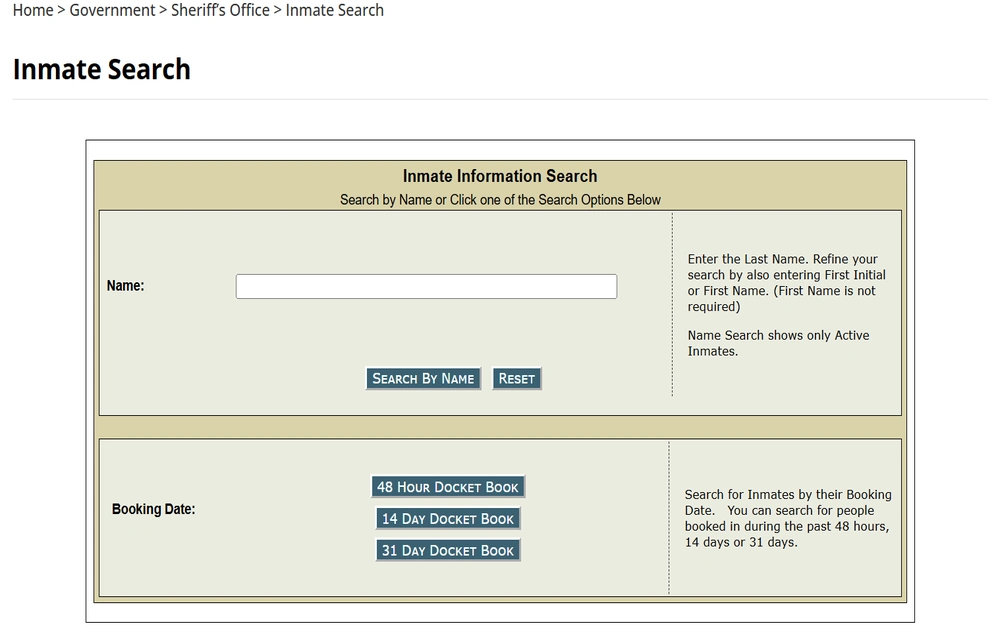
How To View Free Georgia Mugshots Online
Criminal and arrest records in the state of Georgia will typically contain mugshots or photographs; this will occur during record creation. However, due to the commercial gains that rogue websites generate from obtaining these photographs and using them for malicious purposes, the Georgia State Legislature passed the Georgia Mugshots Law in 2013 and 2014.
This law (35: §35-1-19) has prohibited law enforcement agencies from publishing mugshots on arrest records. Agencies may only publish this photograph if the subject of the mugshot signs a statement permitting them to do so. Thus, many mugshots will display that the ‘image is unavailable due to the law.’
Juvenile Records: Are They Public Records in Georgia?
Juvenile records are minor criminal records- they are records for individuals under the age of 16 who have committed an offense and are in juvenile court proceedings.
In the state of Georgia, due to the Georgia Open Records Act (ORA), unlike in many other states, juvenile criminal records from the Department of Juvenile Justice are often accessible to the public for inspection and reproduction, except where they are exempted from disclosure under the law.5
In 1995, the state of Georgia enacted legislation that would allow court proceedings from juvenile courts to be open to the public. Juvenile case records involving felony charges or those concerned with child support hearings are always available to the public.
The Georgia juvenile points system is categorized into 10 decision points. Its points were defined in consultation with the U.S Department of Justice. Juvenile systems are supposed to be rehabilitative to allow minors to correct their behavior, thus giving them a second chance and preventing future offenses.
The point system is outlined below.
- At-Risk Population: these are minors aged 0-16 and categorized ethnically
- Arrests: these include referrals to law enforcement or juvenile courts
- Referrals to Juvenile Court: this represents referral charges to juvenile courts, which may include multiple charges
- Cases Diverted: this refers to the number of cases being diverted
- Secure Detentions: this category refers to the total number of new admissions to a Regional Youth Detention Center (RYDC)
- Petitions: this refers to the petitioned cases to juvenile court; the most serious outcome being neither a dismissal nor a diversion
- Delinquent: refers to the finding of delinquency in court; the charges must be a misdemeanor or felony
- Commitments to DJJ: this category refers to the number of cases resulting in commitment
- Secure Confinement: is measured by the total number of youth placed in RYDC
- Cases Sentenced in Adult Court: refers to the total number of superior court sentences with court dates
How To Tell if You Have a Warrant in Georgia (Free GA Wanted Search)
A warrant is a legal document that gives legal authority to law enforcement personnel to take an individual into custody or search their premises.
Individuals can check for Georgia warrants via the local police department or sheriff’s office within the jurisdiction. The Georgia Bureau of Investigation provides a list of Law Enforcement Links to agencies in the state.
Often, these law enforcement agencies have warrant divisions that can be combed to obtain this information. Interested persons will need to furnish the agencies with full names as well as their DOB to allow for a successful search. Requesters may either phone the department or visit in person to make inquiries. It should be noted that if a warrant exists against the enquirer, they likely will immediately be taken into custody.
For example, Dalton County maintains a warrant list that is continuously updated.6
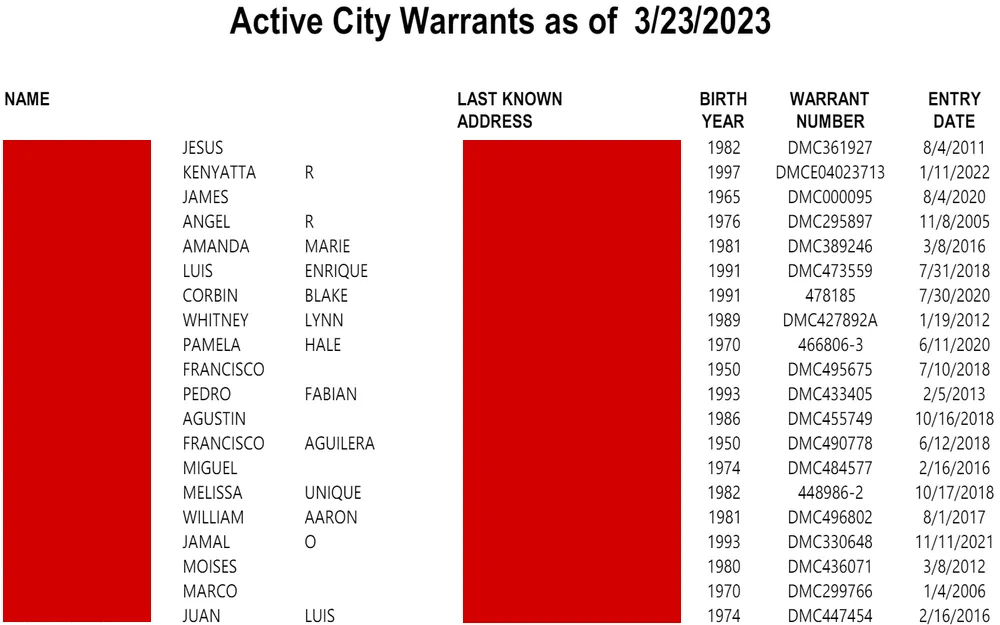
Additionally, the requester may also contact the court clerk that has jurisdiction over where the warrant was issued.
How Do I Find Sex Offenders in My Area of Georgia?
In accordance with the Georgia Legislature O.C.G.A. § 42-1-12, The Georgia Bureau of Investigation maintains the primary repository for Georgia’s Sex Offender Registry data.
Sex offender records are public in the state. Requesters to this information will visit the GBI to locate sex offender information. The GBI has a sex offender locator tool that allows users to locate a sex offender within the community.7
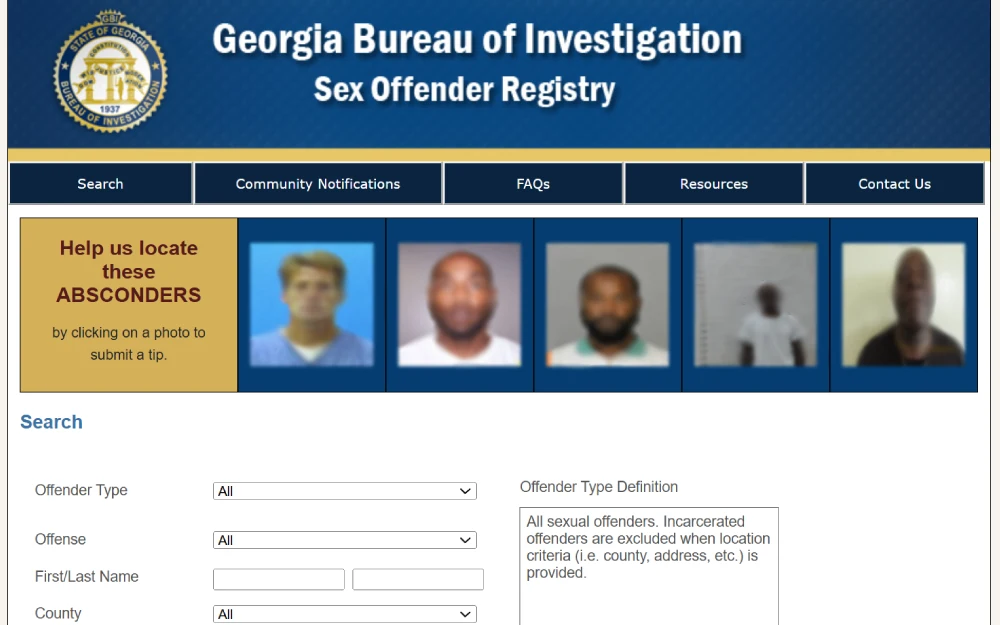
When a requester has accessed information about a sex offender, they may proceed to the sheriff’s office department in the county where the offender is registered.
They may retrieve data on the offender, such as the employer’s address, vehicle registration, and school addresses (if applicable). Fulton County Sherriff’s Office is a typical example of a Sex Offender Search tool.8
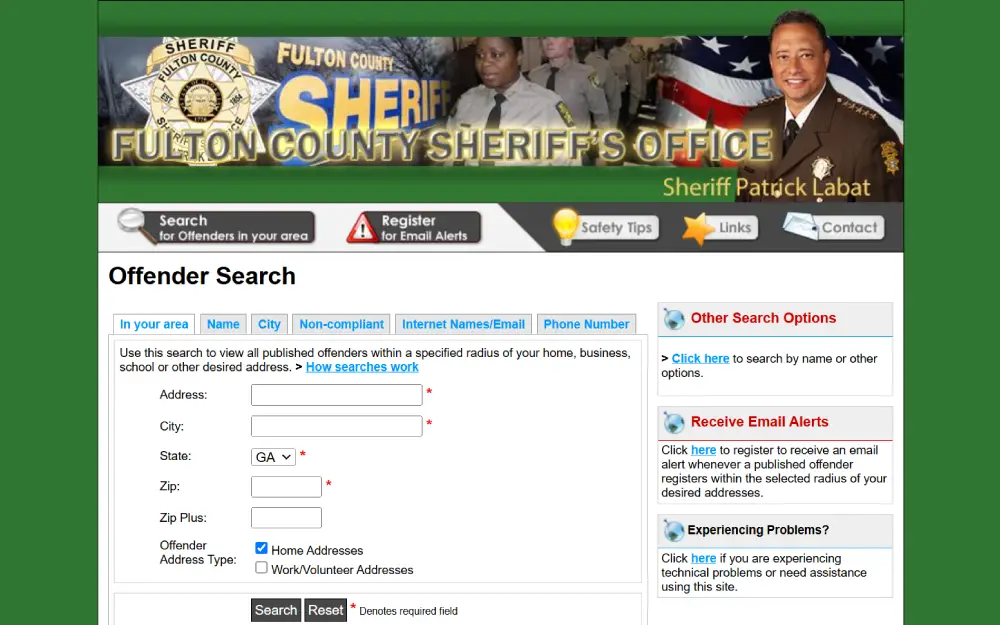
Georgia Background Checks (Search Criminal Records & More)
Georgia background checks are of different types depending on who is requesting them and for what purpose. They broadly fall into five categories:
- Criminal history check: this will include data such as past arrests, convictions (sentence information), dispositions, charges, etc.
- Education background checks: this allows requesters to verify the subject’s education credentials such as degrees thus ensuring only qualified individuals are hired
- Employment background checks: verification of past employment of the subject ensuring the job experiences are genuine to perform the work at hand
- Driving record checks: assessing the subject’s Department of Motor Vehicles (DMV) records such as accidents, moving violations, and felonies in regards to road rules
- Credit checks: investigating an individual’s credit history for bankruptcies, foreclosures, etc.
Georgia background checks are pertinent to ensuring the safety of the community, the workplace, and schools. The checks also ensure that homeowners rent to the right individuals, thus keeping neighborhoods safe.
A number of facilities are required to perform a background check on their employees; these include: nursing homes, hospices, assisted living, personal care homes, child-care facilities, etc.
Citizens (owners, employees, administrators, directors, etc.) looking to complete a background check will proceed to the Georgia Criminal Background Check System (GCHEXS) and will need to request a username and password from the system.9
They will then input details such as the type of facility the check is for, the user type, etc., allowing them to complete the process on the check.
Georgia businesses that need to complete a fingerprint-based background check on employment applicants must use the online Georgia Applicant Processing Service (GAPS). Employers will need to have a GAPS account number. Citizens may also use GAPS to perform a fingerprint-based background check by clicking the ‘Applicants Registration’ tab. More details can be found by visiting the site regarding fees, processing times, etc.
Georgia background checks have a 7-year look-back period; therefore, arrests that did not result in a conviction are not reported for the said time frame. This is to ensure complacency with the Fair Credit Reporting Act mandate.
What Shows Up on Georgia Court Records Searches? (Find Free Divorce Records in GA)
Court records are Georgia public records in accordance with the state’s Open Records Act; they are thus available for public viewing, scrutiny as well as record reproduction.
There are some records that may not be accessed by the public, these include court seal records by the order of a court, and some juvenile court records are closed to the public.
Typically court records in the state of Georgia include:
- Docket information
- Court decisions and orders
- Pieces of evidence presented by either case in a trial
- Pleadings and motions
- Judge’s remarks in a court case, etc.
How Do I Look Up Court Documents & Records in Georgia?
Individuals looking to request court documents in Georgia may do so by visiting the courts, by phone, mail, or online avenues.
Offline
Individuals who are looking to locate court documents and records in Georgia will need to proceed to the court with the jurisdiction of the case. A form can be requested from the clerk of the court, the point of contact to complete the inquiry. An online court directory can be found here to aid individuals looking to locate the correct court to make the request.10
Requesters looking to access records and documents from the Supreme Court of Georgia’s case management system may do so by contacting (404)656-3470 and furnishing the case number and/or party names. These may then be transmitted electronically.
Individuals looking to access records and documents from the Court of Appeals of Georgia may visit the court to obtain the records. Individuals should call before proceeding to the court to ensure the records requested are available. The court charges $1.5 per page. The court of appeals clerk is located at:
330 Capitol Ave SE,
Atlanta, GA 30334
Online
Many counties have a case search feature located on their websites. For example, Gwinnett Courts have a Case Search feature on their website. The requester should proceed to the correct court with jurisdiction of the case and use the case number as a search criterion; if this is unknown, then the parties’ full names.
The Georgia Judicial Gateway has an E-Access that allows the user to select the court over which has jurisdiction of the court record, allowing the user to execute a search.11
How To Get Georgia Bankruptcy Records
Bankruptcy cases in Georgia are legal proceedings where individuals can terminate debt. Individuals file for bankruptcy per the U.S. Bankruptcy Code.
In Georgia, bankruptcy records may be retrieved by employing the Public Access to Court Electronic Records (PACER), which has a PACER case locator tool that allows individuals to retrieve and view bankruptcy records in the state.12 Requesters must register with the site and access bankruptcy case records at a $0.1 per page cost.
Bankruptcy records can also be obtained from the office of the clerk of the bankruptcy court with jurisdiction of the case where the trial was held. Requesters for bankruptcy records may obtain records from the Multi-Court Voice Case Information System (McVCIS) by dialing toll-free (866)222-8029.
Older Bankruptcy cases dated before 2001 can be retrieved from the National Archives.
Georgia Inmate Records: An Overview
Georgia inmate records are public in the state and can be accessed and copied freely by residents due to the state’s Open Records Act.
Georgia inmate records typically contain the following information in the data set:
- Release date
- Parole information if applicable
- Location and date of incarceration
- Sentencing information
- Personal data such as name, DOB, sex, etc.
Access to inmate records is essential to many individuals looking to locate family members, loved ones, and friends in prisons and jails across Georgia. It is also crucial information that can help trace missing persons and rule out deaths in many of these cases.
The Georgia Department of Corrections (DOC) states that Georgia has 183 jails in its counties. As of 2019, the number of inmates in jails is 45,340, the number of those housed in correctional facilities under DOC is 54,113 who are located in 34 prisons across the state, while those under probation stood at 411,768 and 19,256 under parole.
How Do I Look Up a Jail Inmate’s Information in Georgia?
Jails are usually maintained by local police departments as well as sheriff’s departments.
Inmates housed in these facilities would typically be serving short sentences for misdemeanors or awaiting trial. Therefore, requesters looking to locate jail inmates’ information in Georgia should contact the aforementioned law enforcement agencies.
They would need to establish the jurisdiction that the inmate is located in and contact the respective department. Many agencies have search features on their sites or maintain inmate rosters. For example, Fulton County has an Inmate Search tool that can be used to locate inmates.13
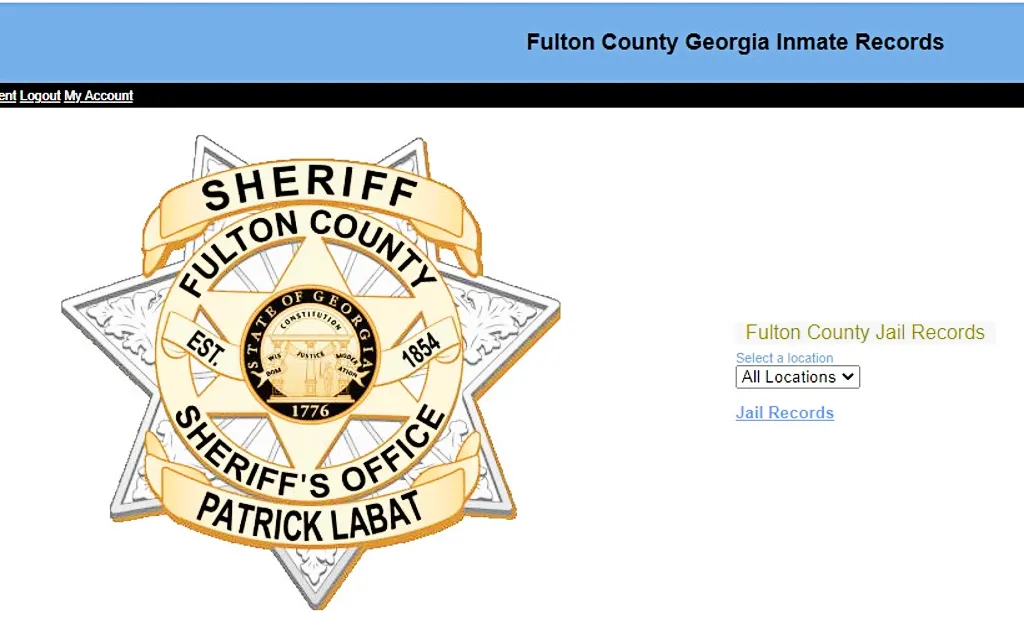
In cases where there is no way to retrieve this, requesters may proceed to phone the law enforcement agencies or schedule an in-person visit.
How To Search for Georgia Prison Inmates
Georgia State Prison
Georgia has 34 state prisons located throughout the state. The prisons are managed by the Georgia Department of Corrections (GDOC), which also maintains a repository of the state’s prison inmate records. The agency has a Find an Offender tool on its website that can retrieve records of the state’s prison population.14
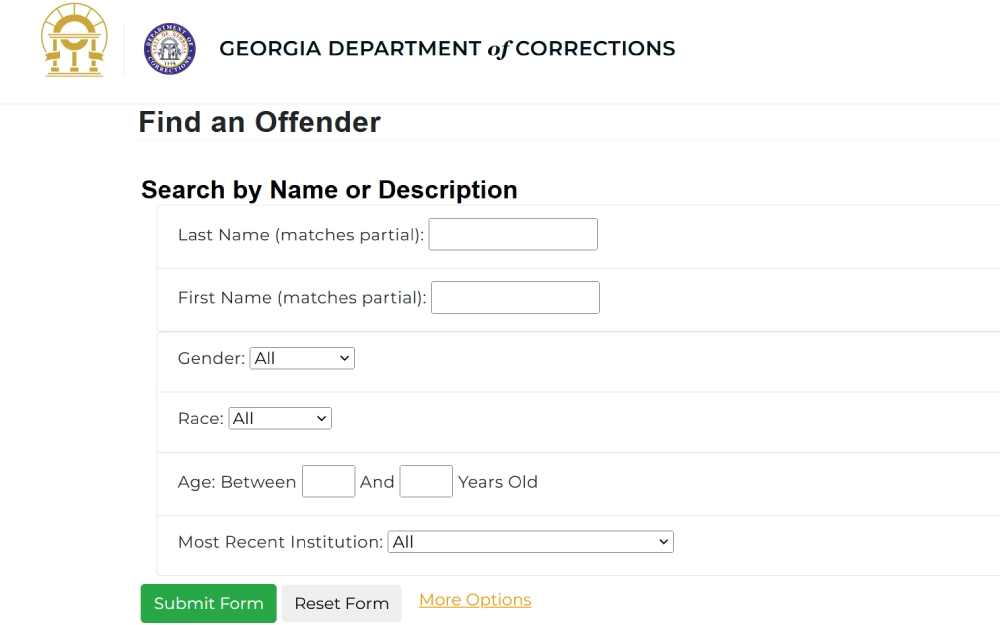
Requesters are also advised by the GDOC to verify the information they have viewed on the site by written correspondence to:
Inmate Records & Information
P.O. Box 1529
Forsyth, GA 31029
Georgia Federal Prisons
There are five federal prisons and two federal prison camps located in the state of Georgia and are maintained by the Bureau of Prisons (BOP).
The BOP maintains a database of inmates that have been incarcerated or released after 1982 in federal prisons throughout the union. It has a Federal Prison Inmate Locator on its website that is free to use, and the requester searches either the user name or inmate number.15
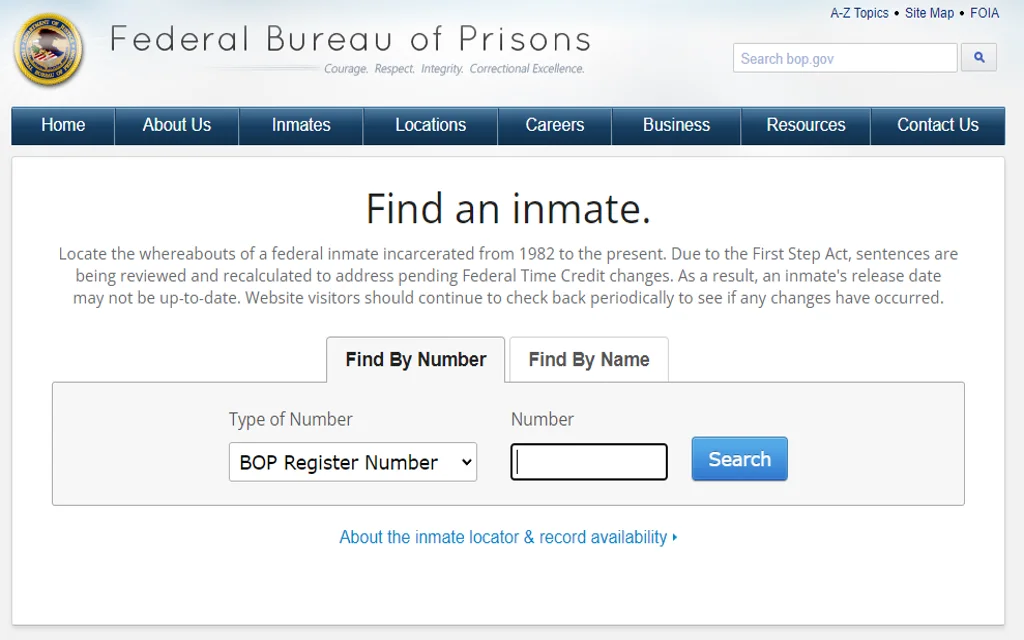
How To Determine When a Georgia Inmate Will Be Released
Knowing when an inmate will be released is a matter of concern for many, including the inmate, family members, friends, and crucially the victim of the inmate if this applies.
In some jurisdictions, it is mandated by law that victims are informed of an upcoming release date or parole hearing; these notifications serve as a way to protect the rights of these victims.
State Prison Release Date
The Georgia State Board of Pardons & Paroles will usually review among other things, an inmate’s conduct in prison or completion of consular programs; the board then sets a release date under parole.16
To check the release date of an inmate, requesters may visit the board’s Inmate TPM Lookup tool.
Requesters may also phone in to inquire about this information by calling (404)656-4661 or email: [email protected] or make an in-person visit to:
Georgia State Board of Pardons & Paroles
2 Martin Luther King, Jr. Drive SE
Suite 458, Balcony Level, East Tower
Atlanta, GA, 30334
Federal Prison Release Date
The BOP tool discussed earlier will usually return the release data of an inmate from the record data set that is queried regarding the inmate.
County Jail Release Date
Inquirers may visit the clerk of the county, local police departments, or sheriff’s office to ascertain the release date of an inmate. A lookup at their websites, phoning in, or making an in-person visit is the method that can be used.
How To Visit & Send Money to Georgia Inmates
Visiting an Inmate
For family and friends, the ability to visit an inmate in Georgia is an important psychological support for both family and the inmate; it also aids in the rehabilitation of the inmate.
Individuals looking to visit an inmate will need approval from the facility where the inmate is located; typically, there is an approved list of those who can visit. Visitations occur on weekends and holidays. It should be noted that the inmate does have a say on who can be on the approved list of visitors.
Visitors will need to furnish the name, Georgia Department of Corrections (GDC ID), and relationship to the inmate. Visitation rules such as dress code must be strictly adhered to.
To schedule an appointment, visit: Make an Appointment.17
Sending Money
While the needs of prisoners are sufficiently met by the GDOC, many times inmates may want to purchase extra items such as snacks which always boost morale. Family members and friends are able to send money to inmates.
An individual wishing to send money to an inmate must be on the approved visitor list. They do this online through the GDC website and can do this in two ways:
- Sending a money order voucher or
- Sending money online via JPay, requesters can set up a JPay account by entering their GDC ID and the names of the inmate.
The breakdown of the fees and Send Money link can be found here.18
Georgia Vital Records Information
Vital Records are records of life events of persons maintained by government authorities. In the state of Georgia, they include:
- Birth records
- Death records
- Marriage records
- Divorce records
- Fetal deaths records
There are two types of copies of vital records; certified and uncertified. Certified copies are official and usually bear a government seal and may be used as identification. Uncertified copies cannot be used as identification and often do not have a government seal.
Vital records in the state of Georgia are maintained by the Georgia Department of Public Health Vital Records Office which serves as the primary repository of vital records in the state.19 All counties within the state can also issue birth and death certificates.
Records that are older than 1919 may be retrieved from the Georgia Archives or by contacting the county where the event occurred.
Can Anyone Access Vital Records in the State of Georgia?
Vital records are part of Georgia public records, and per the state’s Open Records Act, residents and non-residents can access and scrutinize vital records. However, there are some exceptions to some records and who in particular can access either the record or certificate.
Marriage Records
While marriage records are public records in Georgia, marriage application data can only be accessed by the groom and bride of the certificate. The marriage license can be accessed by any member of the public.
Divorce Records
Divorce records are public and there are no restrictions as to who can access such said records. Additionally, marriage and divorce rates are made public by the US Census Bureau and the image below shows the percentage of divorced individuals in every Georgia county.
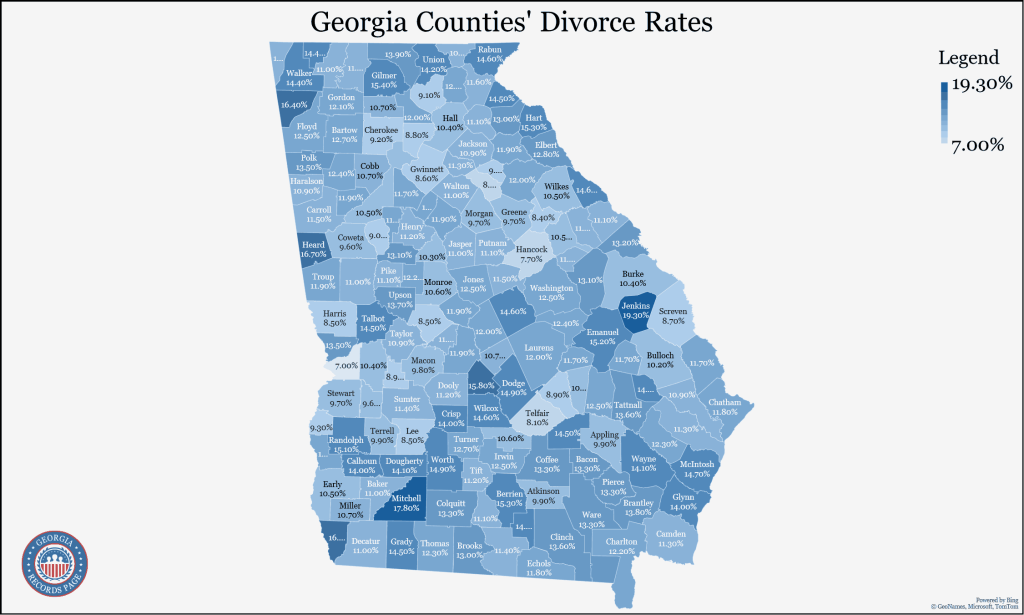
Birth Records
Birth records can be accessed by the individual named on the certificate (registrant), parents and grandparents, siblings, or an offspring of the record holder. Only adults in these categories can access the record. Legal representatives also have access.
Death Records
As in birth certificates, access to death certificates is restricted to immediate family members or legal representatives of the subject of the record. Death records are however available to members of the public with the SSN redacted.
How To Run a Georgia Vital Records Search
Georgia Vital records may be requested through both offline and online methods. They usually can be requested from the county where the vital event occurred or from the vital records office; sometimes through both means.
Online
Requesters may request their vital records conveniently online through 3 methods outlined below:
Rover: Rover is the official government channel, and requests made through this are transmitted directly to the vital records office. There is an additional $8 processing fee to the fees outlined below. Orders are shipped directly from the records office and typically take 4-6 weeks to arrive.
There is an expedited shipping fee for an additional $10, which reduces the time to 5 business days for processing, and an additional 2-3 days for shipping. Orders can be shipped internationally.
VitalChek: VitalChek is a third-party vendor where requesters may use a major credit card. Only birth and death certificates are available through this method. Orders are shipped within 8-10 weeks.
Gocertificates: Gocertificates is another third-party vendor that the public may use to obtain vital records and certificates.20 Requesters may use major credit cards on this platform and only birth and death certificates are available through this method. Orders are shipped within 8-10 weeks.
Offline
When requesting vital records in Georgia, requesters will usually fill out a Georgia vital records form, enclose any applicable fees, and a copy of a valid ID.
Requesters may do this by visiting in person or mailing in the request to:
State Office of Vital Records
1680 Phoenix Boulevard, Suite 100
Atlanta, GA 30349
The lobby hours of this office are 9:00am- 4:00pm, Monday – Friday. A list of the county’s vital records offices and their locations can be found here: Find a Vital Records Office.21
Costs of Obtaining Certificates
- Marriage Certificate: The cost for a marriage certificate is $10 and additional copies are $5.
- Divorce Certificate: The Georgia Department of Public Health Office of Vital Records is not in the custody of divorce records. Whilst they can confirm a divorce, requesters will need to proceed to the county where the divorce was granted. The contact would be the clerk and fees will vary with the county.
- Birth Certificate: Requesters may obtain certified birth certificates either from the local county office where the birth occurred or the Georgia Department of Public Health Vital Records Office. The cost for a birth certificate is $25 and additional copies are $5.
- Death Certificate: The cost for a death certificate is $25 and additional copies are $5.
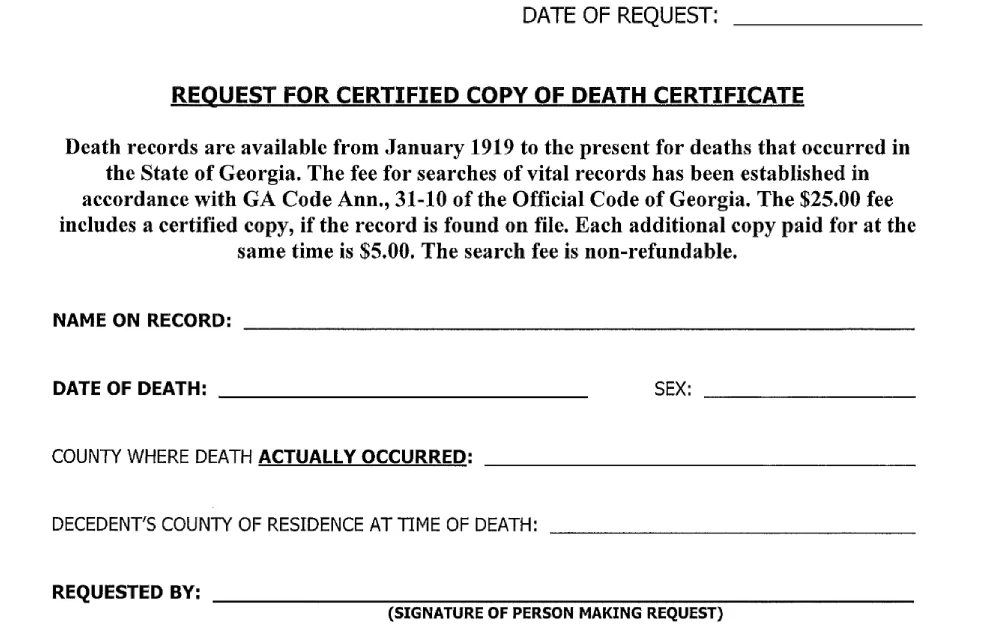
Accessing Georgia public records can be a challenging task, especially with the vast amounts of data as well as different repositories to comb to obtain the required data. Our platform provides an easy way for the requester to quickly and accurately access the information they need.
References
1Georgia Attorney General. (2012). The Open Records Act. Retrieved May 1, 2024, from <https://law.georgia.gov/sites/law.georgia.gov/files/imported/vgn/images/portal/cit_1210/62/51/186385699r1.pdf>
2Freedom of Information Act. (n.d.). Start your FOIA journey. Retrieved May 1, 2024, from <https://www.foia.gov/>
3Paulding County Sheriff’s Office. (n.d.). Georgia Criminal History Record. Retrieved May 1, 2024, from <https://www.paulding.gov/520/Georgia-Criminal-History-Record>
4Clayton County Government. (2024). Inmate Information Search. Retrieved May 1, 2024, from <https://www.claytoncountyga.gov/government/sheriff/inmate-search>
5Georgia Department of Juvenile Justice. (n.d.). Open Records Request. Retrieved May 1, 2024, from <https://djj.georgia.gov/open-records-request>
6City of Dalton Police Department. (2023, March 23). Active City Warrants. Retrieved May 1, 2024, from <https://www.daltonga.gov/sites/default/files/fileattachments/police/page/8791/activecitywarrants.pdf>
7Georgia Bureau of Investigation. (2024). Search. Retrieved May 1, 2024, from <https://state.sor.gbi.ga.gov/sort_public/SearchOffender.aspx>
8Fulton County Sheriff’s Office. (2024). Offender Search. Retrieved May 1, 2024, from <https://www.icrimewatch.net/index.php?AgencyID=55274>
9Georgia Department of Community Health. (n.d.). Georgia Criminal History Check System (GCHEXS). Retrieved May 1, 2024, from <https://dch.georgia.gov/georgia-criminal-background-check-system-gchexs/georgia-criminal-background-check-system-gchexs>
10Judicial Council of Georgia Administrative Office of the Courts. (n.d.). Georgia Courts Directory. Retrieved May 1, 2024, from <https://georgiacourts.knack.com/gcd2/#home/>
11Judicial Council of Georgia Administrative Office of the Courts. (n.d.). Find a Court Case. Retrieved May 1, 2024, from <https://georgiacourts.gov/eaccess-court-records/>
12Public Access to Court Electronic Records (PACER). (n.d.). PACER Case Locator. Retrieved May 1, 2024, from <https://pcl.uscourts.gov/pcl/index.jsf>
13Fulton County, Georgia. (n.d.). Jail inmate search. Retrieved May 1, 2024, from <http://justice.fultoncountyga.gov/PAJailManager/default.aspx>
14Georgia Department of Corrections. (2024). Find an Offender. Retrieved May 1, 2024, from <https://services.gdc.ga.gov/GDC/OffenderQuery/jsp/OffQryForm.jsp?Institution=>
15Federal Bureau of Prisons. (2024). Find an inmate. Retrieved May 1, 2024, from <https://www.bop.gov/inmateloc/>
16Georgia Parole Board. (n.d.). Inmate TPM Lookup. Retrieved May 1, 2024, from <https://pap.georgia.gov/parole-consideration/inmate-tpm-lookup>
17Georgia Department of Corrections. (n.d.). Visit an Inmate. Retrieved May 1, 2024, from <https://gdc.georgia.gov/friends-and-family/visit-inmate>
18JPay Inc. (n.d.). Login. Retrieved April 26, 2024, from <https://www.jpay.com/login.aspx>
19Georgia Department of Public Health. (n.d.). Vital Records. Retrieved May 1, 2024, from <https://dph.georgia.gov/VitalRecords>
20GoCertificates. (n.d.). Order Official Georgia Vital Records Online. Retrieved May 1, 2024, from <https://www.gocertificates.com/new/Georgia.aspx>
21Georgia Department of Public Health. (n.d.). Find a Vital Records Office. Retrieved May 1, 2024, from <https://dph.georgia.gov/locations/vital-records-office>
22Paulding County. (2017, September). Request for Certified Copy of Death Certificate. Retrieved May 1, 2024, from <https://www.paulding.gov/DocumentCenter/View/10423/VR-Death-Certificate-Request-local?bidId=>
